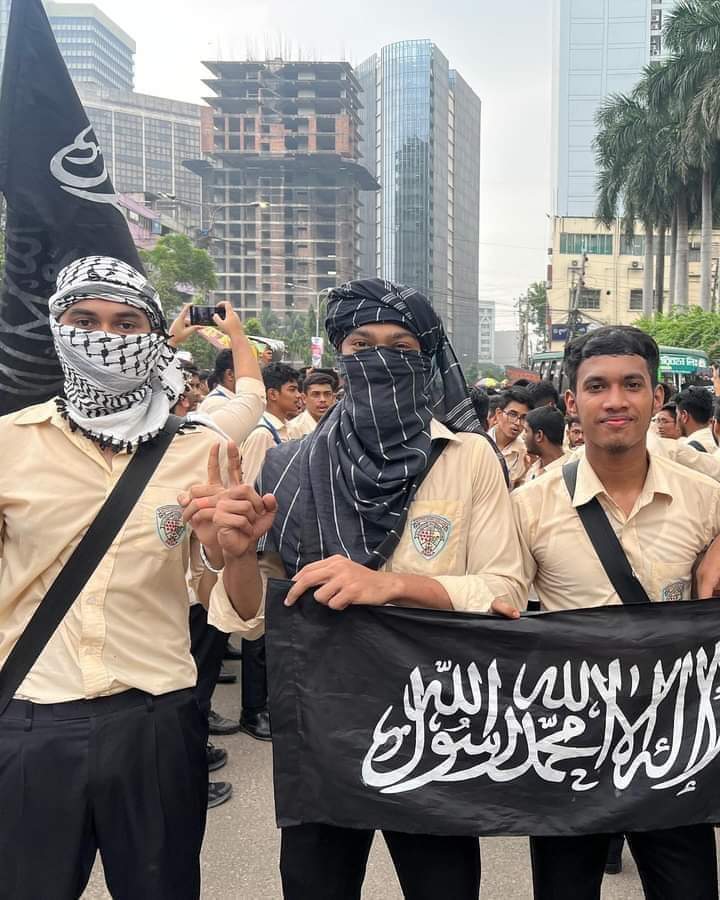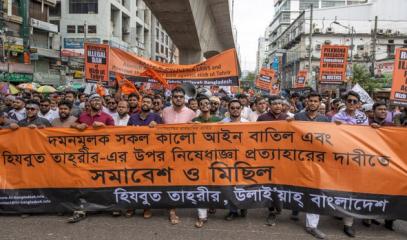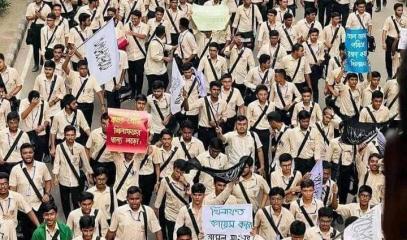Post-Hasina Bangladesh sees radical trend with black flags and pro-Caliphate slogans
The return to freedom of expression, following the fall of the former prime minister, opened up space for extremist movements and groups. In recent street demonstrations, Islamic State-like banners have appeared. Police and law enforcement agencies are in action to avert an extremist escalation, but there are concerns among minorities, including Christians.
Dhaka (AsiaNews) – With the fall of long-time Prime Minister Shiekh Hasina and her exile, one of the most significant consequences for the people of Bangladesh has been the return of freedom of speech and expression, repressed under the previous government.
For over a decade, the government censored various political, social, and religious organisations, which now can openly express themselves.
The downside, according to some critics, is that this renewed openness has also allowed extremist groups, so far held back and blocked by force, to gain visibility, intervene in public and show their distinctive features.
This is the case of the "black flags", sad reminiscent of those of the Islamic State (IS) group with its massacres from the Middle East to South and South-East Asia.
Local sources say that several organisations, once persecuted, are now re-emerging with new energy and vigour, promoting a wide range of activities.
Students from Dhaka's main educational institutions also took to the streets, participating in rallies and meetings, especially on religious issues.
After years of silence, these movements reflect a renewed sense of freedom and civic engagement, an optimistic sign for the future of Bangladesh if there were no fear of a religious extremism.
Last week, hundreds of students from different colleges and schools, including important Christian missionary institutes such as Notre Dame College (NDC) and St. Joseph's Higher Secondary School, promoted protests.
The demonstrators also called for an end to the genocide in Palestine (West Bank and Gaza), condemned the insults against the Prophet Muhammad, and called for the establishment of an Islamic Caliphate governed by sharia, Islamic law.
These rallies have sparked tensions, especially among progressive Muslims and religious minorities, who fear for their survival in the event of a rise to power - or even just a growing visibility, of the extremist fringe.
Some argue that the black flags resemble those used by militant Islamic groups, including the Islamic State.
It is also suspected that these protests may have been instigated by a political party, which intends to foment chaos.
A Notre Dame College student banner read, “Establish the Caliphate and safeguard the honour of the Prophet Mohammed.”
In several areas of Dhaka, messages promoting the radical Islamic model of the state have been written on walls.
The only path to true freedom and liberation is the Caliphate system," preached the student group Anjumane al Bayyinat in the Farmgate area of the city
Law enforcement, meanwhile, suspects that the demonstrators are members or affiliates of the banned organisation Hizb ut-Tahrir.
Dhaka Metropolitan Police Commissioner Mainul Hasan said that "Hizb ut-Tahrir is a banned organisation. They cannot operate openly, so they are attempting to act hastily. Our operation against them is ongoing.”
A video posted on social media by a journalist shows school and university students marching in front of Dhaka's Jatiya Sangsad Bhaban on 6 October, also with black flags.
The march was held under a banner that read: “Conscious teachers and students. St Joseph’s Higher Secondary School". Students carried black flags with writings, alongside the flags of Bangladesh and Palestine.
A video circulating on social media shows a procession in Kishoreganj on 4 October, organised by "Tawhidi Jantar". While the participants protested against the insults to Muhammad and called for the creation of an Islamic caliphate, some foreigners also joined in, some wearing black flags and large coloured scarves.
Kadruddin Shishir, a fact-checker and expert in verifying news, carefully analysed the video, noting that the black flag used resembled those associated with IS.
Shafi Md Mustafa, a professor at Dhaka University, adds that the use of these flags in Bangladesh suggests a link to extremist movements.
Meanwhile, the banned militant group Hizb ut Tahrir has tried to get its ban lifted, positioning itself within a political movement with the aim of overthrowing the government.
Security experts warn that this could fuel radical militancy, while police are already in action trying to prevent it.
Religious minorities, especially Christians, have expressed concerns for their safety, fearing new attacks or an escalation of violence.
12/06/2021 12:33









.png)










